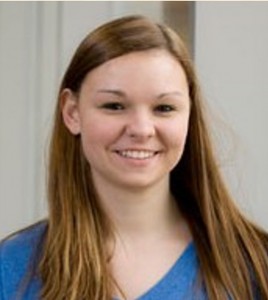By: Chris Lowe
Some of our iJOBS participants have been able to complete an industrial internship during their PhD studies. In this post we sit down with Paulina Krzyszczyk, a 5th year PhD student in Biomedical Engineering, to learn about her internship experience and see what advice she would offer other students looking to transition into industry.
Q: Where did you complete your internship and what was your role?
Paulina: I was working at Integra Life Sciences in Plainsboro, NJ and I was working in a neuroscience group in research and development.
Q: What were some of your responsibilities while you were an intern?
Paulina: At first, after I completed training, I helped out with some of the existing experiments but eventually I had an independent project. I was testing the mechanical strength of collagen sheets. It was different from my regular research because it was more biomaterials focused instead of doing cell work every day like I do in my thesis research. I was focused on looking at mechanical properties and trying to improve the manufacturing process for one of their products.
Q: Besides the shift in technical focus, how was the day-to-day work at Integra different from your academic lab?
Paulina: At Integra it was very team-based. Most of the decisions were made as a group; we would plan experiments together and then we would discuss results together. There were also business meetings to discuss how to advance a particular product. So as everything was done, each aspect was much more team based. Regulatory considerations were also constantly in mind. In my academic lab we don’t think about the FDA approving our research every day, but in industry, if they’re trying to make a product, they try to do it the best way possible so it can be approved.
Q: What PhD skills did you find most useful during your internship?
Paulina: I think the skills that were best for me were lab-based. I knew how to do hands on techniques; those were developed pretty well. I also knew how to design my experiments, analyze the results and make meaning out of them. The understanding of the scientific process, which I had gained up to that point in graduate school, helped me think critically about the experiments, results and next steps in order to push the project forward. Also, troubleshooting unexpected results and finding creative ways to solve problems is something that I learned at my Rutgers lab. This skill was highly relevant to an industry R&D position as well.
Q: Were there any skills you wanted to improve or knowledge gaps you wanted to fill after completing your internship?
Paulina: I think just being more familiar with the regulatory process because that’s a key thing that drives almost everything they do. The FDA was also visiting for a period during that summer which really reinforced this for me. It’s a big focus of industry work and being familiar with what the FDA does and how they interact with a company is important.
Q: Did you have any significant takeaways from the experience?
Paulina: I think one of the biggest takeaways was building my network. I’m still in contact with several co-workers, as well as my supervisor. This has proven helpful not only for reference letters for various awards that I have applied to, but also as a good contact and sounding board. My supervisor got his PhD; he’s been through the process, he knows what it’s like to be an early PhD student, a later PhD student, and then looking for a job. Even just having the opportunity to reach out to him and ask him for advice is something that I truly value from the internship experience.
Q: Do you have any advice for students who may be considering an internship.
Paulina: Just be open to talking to people, helping them troubleshoot and perhaps even collaborating with them. In academia you can probably get away with doing your work yourself, but in industry you can’t get away from that. Practice talking to people while you’re in academic research so that you’re prepared to do that in industry.
Q: Do you feel like the internship was worthwhile to you, even though you had to put your PhD on hold for a few months?
Paulina: I think it was good doing it in the beginning. I didn’t feel like I was really missing anything by being gone from lab since it was so early in my PhD career. It also kind of opened up my eyes to what I want to do once I leave and I can help fill in the gaps in my knowledge and experience in the meantime.
Q: How did the internship alter your plans for your career?
Paulina: It was my first experience working in industry and I learned about the culture firsthand. I liked the company culture generally, but I also know that each company has a different culture which is why I would consider doing a second internship close to the end of my PhD studies.
Q: Do you know what you want to do after your PhD?
Paulina: I want to work in industry. Probably start with a research role and go up from there.
If you’d like to learn more about Paulina’s PhD journey and hear other advice she has to offer, you can read some of her posts on the iJOBS blog here: http://ijobs.rutgers.edu/wordpress/author/paulinak/
